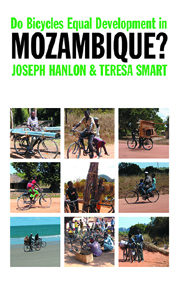Book contents
- Frontmatter
- Contents
- Acknowledgements
- The authors
- Money & measurements
- Abbreviations, acronyms & glossary
- Part I IS THERE DEVELOPMENT IN MOZAMBIQUE?
- Part II ACTORS & CONTEXT
- Part III ALTERNATIVES & THE DEVELOPMENTAL STATE
- 13 Questioning the cargo cult
- 14 Increase demand to kick-start the economy
- 15 Agriculture & the new role for the state
- 16 Finance & a development bank
- 17 The developmental state builds capitalism
- 18 Can Mozambique stop putting its hand out & become a development state?
- Appendix 1 Aid
- Appendix 2 Investment & other tables
- Bibliography
- Index
13 - Questioning the cargo cult
from Part III - ALTERNATIVES & THE DEVELOPMENTAL STATE
Published online by Cambridge University Press: 05 April 2013
- Frontmatter
- Contents
- Acknowledgements
- The authors
- Money & measurements
- Abbreviations, acronyms & glossary
- Part I IS THERE DEVELOPMENT IN MOZAMBIQUE?
- Part II ACTORS & CONTEXT
- Part III ALTERNATIVES & THE DEVELOPMENTAL STATE
- 13 Questioning the cargo cult
- 14 Increase demand to kick-start the economy
- 15 Agriculture & the new role for the state
- 16 Finance & a development bank
- 17 The developmental state builds capitalism
- 18 Can Mozambique stop putting its hand out & become a development state?
- Appendix 1 Aid
- Appendix 2 Investment & other tables
- Bibliography
- Index
Summary
‘Our policy is to attract foreign investors who bring capital and do not need Mozambican banks in order to invest. The investor has access to markets and brings know-how and even staff in order to train Mozambicans,’ explained Roberto Albino, director of the government's Commercial Agriculture Promotion Centre (CEPAGRI, Centro de Promoção Agrária). And he went on to cite sugar, which now accounts for more than 60% of Mozambique's irrigated agriculture, and has been developed entirely by foreign investors.
In an interview on 26 October 2006, Aiuba Cuereneia, Planning and Development Minister and a member of Frelimo's Political Commission, set out the government's development policy as follows: ‘Priority must be given to human capital. This is the main capital of Mozambique and it is very low now. People must be educated. The state must invest in giving people capacity. Education is the future of this country. ‘The second key area is improving infrastructure – energy, water, roads – especially to support agricultural marketing. The third area is reducing bureaucracy and creating the conditions for business. The government can create the conditions, but then ‘we must leave it to the market,’ he continued. Business ‘has to grow by itself’. Mozambique needs ‘a serious class of managers’ but the private sector must create them, not the government. Mozambican business people start from a very low base because there has been very little accumulation. Building a business class will be a long process. That means, he concluded, that for the next few years, ‘unfortunately, most investment will be foreign’.
- Type
- Chapter
- Information
- Do Bicycles Equal Development in Mozambique? , pp. 145 - 153Publisher: Boydell & BrewerPrint publication year: 2008

